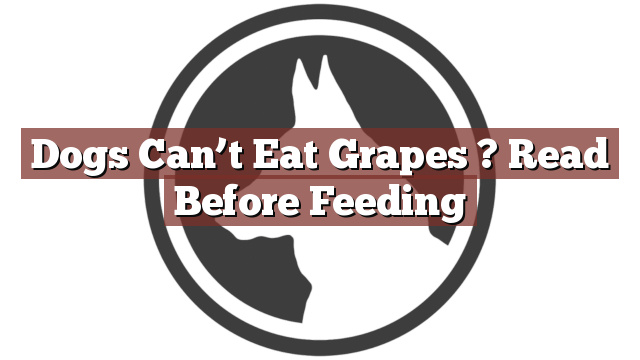Understanding Your Dog’s Dietary Needs
As a dog owner, it is essential to understand your furry friend’s dietary needs to ensure their overall health and well-being. Dogs, like humans, require a balanced and nutritious diet to thrive. However, what might be safe and healthy for us may not necessarily be the same for our canine companions. It is essential to be aware of the foods that can be harmful to dogs to avoid any potential risks or health issues.
Dogs Can’t Eat Grapes? Read Before Feeding
Can dogs eat grapes? This is a question that often arises among dog owners. The answer, in bold, is no. While grapes are a popular and healthy snack for humans, they can be extremely harmful to dogs. The exact reason behind the toxicity of grapes to dogs is still unknown, but it is believed that certain compounds present in grapes can cause severe kidney damage. This applies to all types of grapes, including both red and green varieties, as well as raisins.
It is crucial to note that even a small amount of grapes or raisins can be potentially toxic to dogs. The symptoms of grape toxicity can vary from mild gastrointestinal upset to more serious conditions such as kidney failure. Signs of grape toxicity in dogs may include vomiting, diarrhea, loss of appetite, weakness, and increased thirst. If you suspect that your dog has ingested grapes or raisins, it is vital to seek immediate veterinary attention.
Pros and Cons of Feeding Grapes to Dogs
In light of the potential risks associated with grapes, there are no pros to feeding them to dogs. While grapes may be a tasty treat for humans, they should never be included in a dog’s diet. The cons, on the other hand, are significant. Feeding grapes to dogs can lead to severe health complications, including kidney failure, which can be life-threatening.
It is important to highlight that the toxicity of grapes is not dependent on the size or breed of the dog. Even small amounts of grapes or raisins can be harmful, regardless of the dog’s size. Even if your dog has consumed grapes in the past without any noticeable adverse effects, it does not mean they are immune to the potential dangers. It is always better to err on the side of caution and avoid feeding grapes to your furry friend altogether.
Conclusion: Grapes Are Harmful to Dogs – Avoid Feeding Them
In conclusion, it is crucial to be aware that dogs cannot eat grapes. Grapes and raisins can be toxic to dogs, potentially leading to severe kidney damage and even kidney failure. As responsible pet owners, it is our duty to prioritize our dog’s health and well-being by providing them with a safe and balanced diet. Always remember to keep grapes and raisins out of your dog’s reach and opt for dog-friendly treats instead. If you ever suspect that your dog has ingested grapes or raisins, seek immediate veterinary attention to ensure their health and safety.
Thank you for taking the time to read through our exploration of [page_title]. As every dog lover knows, our furry friends have unique dietary needs and responses, often varying from one canine to another. This is why it's paramount to approach any changes in their diet with caution and knowledge.
Before introducing any new treats or making alterations to your dog's diet based on our insights, it's crucial to consult with a veterinarian about [page_title]. Their expertise ensures that the choices you make are well-suited to your particular pet's health and well-being.
Even seemingly harmless foods can sometimes lead to allergic reactions or digestive issues, which is why monitoring your dog after introducing any new food item is essential.
The content provided here on [page_title] is crafted with care, thorough research, and a genuine love for dogs. Nevertheless, it serves as a general guideline and should not be considered a substitute for professional veterinary advice.
Always prioritize the expert insights of your veterinarian, and remember that the health and happiness of your furry companion come first.
May your journey with your pet continue to be filled with joy, love, and safe culinary adventures. Happy reading, and even happier snacking for your canine friend!

